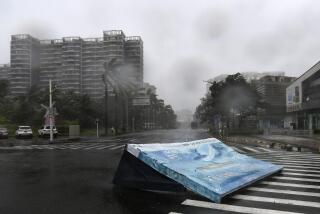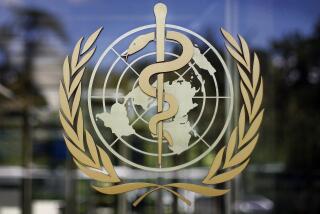WHO Is Alarmed by Spread of Avian Flu in Southeast Asia
HANOI — Health officials said Saturday that the death of a boy from bird flu in Ho Chi Minh City was the first in southern Vietnam and expressed alarm that the outbreak had spread through much of Southeast Asia.
Five Vietnamese previously died of the disease, but all had fallen ill far to the north, outside Hanoi.
Officials say that despite the slaughter of millions of chickens in an effort to contain the disease, tests showed that the virulent H5N1 strain of avian influenza had spread from birds to people in Vietnam and Thailand.
There is no evidence that the disease is spreading from human to human, but experts worry that the virus could change its form or combine with another virus and cause a deadly worldwide epidemic.
“Our greatest fear is that the virus will change itself,” said Robert Dietz, spokesman for the World Health Organization in Vietnam. “Because this virus is now so widespread across Southeast Asia, there is more opportunity for it to change into something that can be transmitted between human beings.”
Officials say the bird flu has the potential to be far more serious than SARS, or severe acute respiratory syndrome, which killed more than 700 people and caused millions of dollars in economic losses when it swept through the region a year ago.
The avian virus apparently had months to spread among chickens in Vietnam and Thailand before the governments of the two countries acknowledged its presence and began taking steps to control it. Officials say that of the six confirmed deaths from avian flu in Vietnam, five have been children.
The latest death, that of a boy in Ho Chi Minh City, occurred Thursday, the WHO said. Tests showed that a young girl in Ho Chi Minh City also had contracted the disease. She is hospitalized in critical but stable condition.
Health officials are investigating additional suspected cases. Experts fear that there may be more cases in rural areas of Vietnam where medical care and testing to detect avian flu are limited.
In Thailand, after weeks of denying the presence of the virus, officials confirmed Friday that two boys had contracted the disease and three other cases were suspected.
The announcement prompted charges from government critics that officials had attempted to cover up the disease for fear of harming the poultry industry. Countries in Europe and Asia immediately banned the importation of chickens from Thailand.
The victims in Vietnam and Thailand appeared to have caught the disease by touching or breathing contaminated bird fecal matter or saliva.
Officials say there is no evidence that people can contract bird flu by eating contaminated chickens as long as they are properly cooked.
Outbreaks of avian flu have been reported in birds in Japan, South Korea, China and Cambodia, and officials fear that it has spread to other countries in the region.
“Because of government inertia and the inability to recognize the problem, it’s gotten a very strong hold on Southeast Asia and possibly adjacent regions,” Dietz said.
Medical experts say the best way to control the disease is to contain the virus and eradicate all animals that may have been exposed to it.
Previously, the most serious outbreak of avian flu was in 1997 in Hong Kong. Authorities there destroyed all of the colony’s chickens in three days to eradicate the disease. Even so, six people died from the virus.
In Vietnam, health authorities have killed 2.9 million chickens, but that is a small portion of the country’s estimated 200 million fowl.
One Vietnamese government official who asked not to be identified said authorities had come to understand that they must move aggressively to halt the spread of the virus. “Bird flu is more serious than SARS and we must be active in controlling it,” he said.
In Thailand, authorities were scrambling to destroy infected flocks and pledged to control the disease within a month.
But Dietz was skeptical about the ability of the governments to contain the virus.
“It’s one thing to kill all the chickens in an area like Hong Kong,” he said. “It’s another to kill all the chickens across Southeast Asia.”
More to Read
Sign up for Essential California
The most important California stories and recommendations in your inbox every morning.
You may occasionally receive promotional content from the Los Angeles Times.










